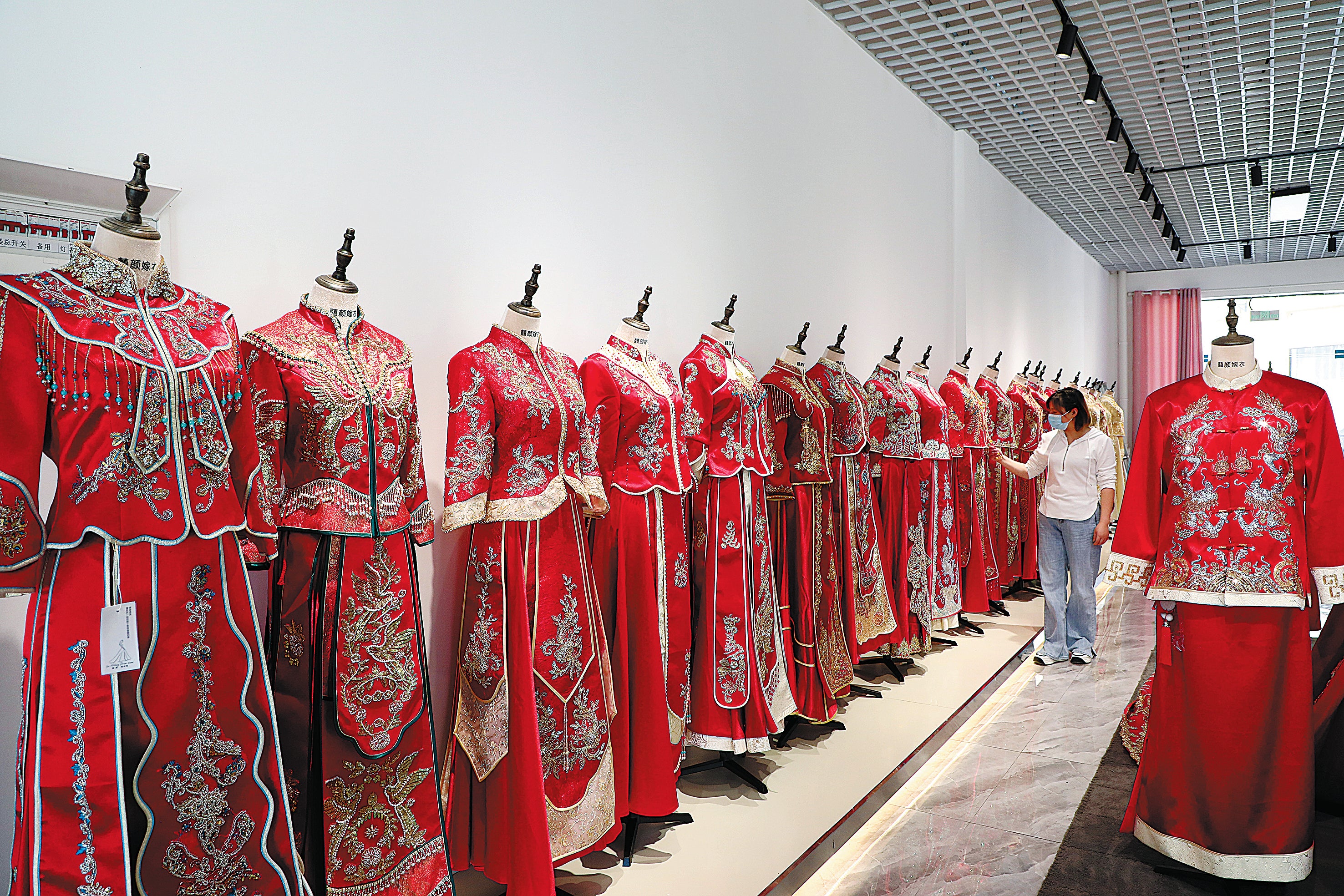Township dresses everybody to the nines for the big day
THE ARTICLES ON THESE PAGES ARE PRODUCED BY CHINA DAILY, WHICH TAKES SOLE RESPONSIBILITY FOR THE CONTENTS

One day in early May, Sun Xiaolong and his fiancée walked into a wedding dress shop in a township in the city of Lu’an, Anhui province.
About two hours later, the young couple walked out with three bridal gowns of Western and traditional Chinese styles.
“The dresses cost merely 1,500 yuan (£185), a lot less than renting from a wedding service company,” Sun says.
With thousands of wedding dress factories and shops, the township of Dingji in Yu’an district, Lu’an city, is one of the largest manufacturing and sales centres for bridal gowns in China.
Lu’an generally sells about 25,000 wedding dresses and other apparel each day, says Yang Xuejun, president of Yu’an district’s wedding-dress industry association. Most of the dresses are produced in Dingji, he says.
The township’s wedding clothes industry exported goods worth $40 million (£34 million) in 2019, says a local official.
Xu Changying, a businessman, says his products have always been available overseas, especially in the United States and Europe.
“But it was very hard to know how much the trade was worth because exports were mostly done by intermediary companies from cities such as Suzhou and Guangzhou,” Xu says.
Suzhou, in neighbouring Jiangsu province, is the largest trade centre in China for wedding dresses, accounting for about 70 per cent of the domestic market.
“In recent years, an increasing number of plants have moved from Suzhou to Dingji as more industry activity shifted there,” Xu says.
Xu, a Dingji native, moved back to the township in 2010, eighteen years after migrating to Suzhou to work in a bridal gown factory. After accumulating production and sales skills, he invested more than 50,000 yuan (£6,200) in establishing a workshop in Suzhou in 1994, when the country’s annual average per capita income for urban residents was 3,180 yuan (£392).
“By 2010, my plant had nearly 50 workers, in contrast to seven at the beginning.”
After returning to Dingji, Xu set up the town’s first wedding clothes factory. And just as he had brought many fellow townspeople to work in Suzhou years ago, they have followed Xu once again.
The township now has nearly 2,000 factories and shops related to the wedding clothes industry, which has attracted thousands of workers from other regions.
“Now half of the township’s 54,000 people are engaged in the wedding clothing business, either in Suzhou or locally,” says Zong Qiyan, deputy Party secretary of Dingji.
The wedding clothes industry in Lu’an reported that it had produced goods worth more than 3 billion (£370 million) yuan in 2021, with Dingji accounting for more than two thirds of that.
“Due to the impact of the pandemic, sales have dropped significantly in the past two years, and we remain optimistic about growth,” Xu says.
He kept an outlet for sales in Suzhou for his son to manage and set up a team of three designers in Guangzhou, Guangdong province.
Both at home and overseas “designs with traditional Chinese elements such as mandarin collars and embroidery have been increasingly popular”, he says.
Xu says his company produces mainly middle and top-grade wedding dresses, priced at about 1,000 yuan (£123) each for wholesale.
Wang Jifeng, owner of the shop that Sun and his fiancée visited, switched from selling regular clothes to wedding dresses exclusively in March 2022. Western and Chinese styles are equally popular, she says.
While Wang runs only a brick-and-mortar store, Yu’an district’s wedding dress industry association says about 80 per cent of local companies operate solely online.
Zheng Xianjun, a local businessman, says, “E-commerce can reach more people, so as a result, being located in a small inland city like Lu’an is no longer an obstacle.”
Yang Xiuling contributed to this story.
Subscribe to Independent Premium to bookmark this article
Want to bookmark your favourite articles and stories to read or reference later? Start your Independent Premium subscription today.